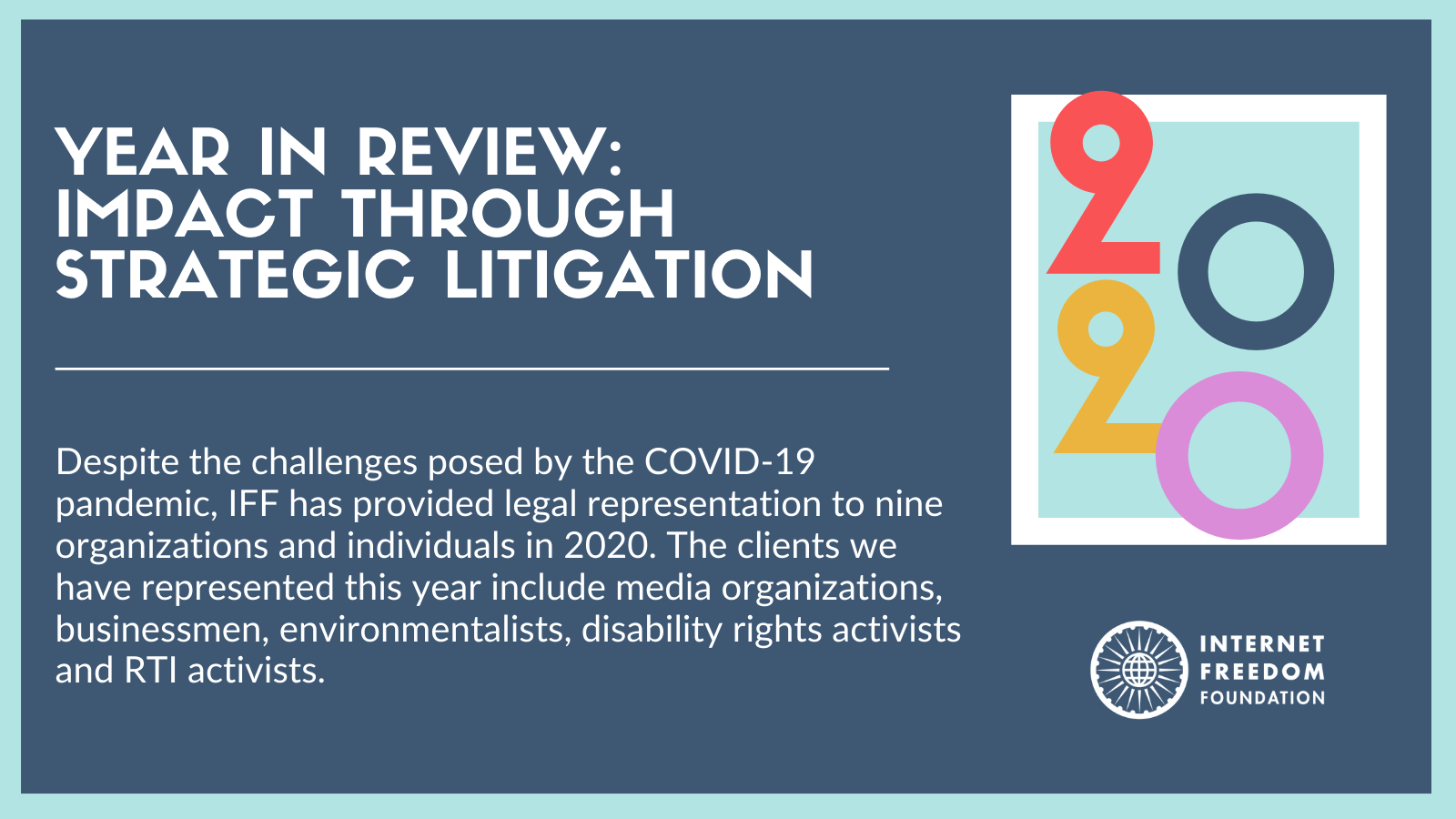
2020 has been a challenging year for IFF’s litigation team because the functioning of the Supreme Court and High Courts was disrupted by the COVID-19 pandemic. After the nationwide lockdown was announced in March 2020, courts across the country shut down their physical premises and migrated to virtual hearings conducted through video conferencing. Virtual hearings have been marred by technical glitches and courts have been reluctant to conduct substantive hearings in regular matters which do not involve any urgency. However, threats to our civil liberties have only increased during this period with the government using the pandemic as an excuse to launch surveillance projects such as the Aarogya Setu app and the BECIL tracking tool for healthcare workers and patients.
Growing strategic litigation for digital rights
Despite these challenges, we worked with highly skilled and accomplished litigators to provide pro-bono legal representation to nine organisations and individuals in 2020. The clients we have represented this year include but are not limited to:
-
Foundation for Media Professionals, a journalist body which challenged the 4G mobile internet ban in Jammu & Kashmir. 4G mobile internet was finally restored in 2 out of 20 districts of Jammu & Kashmir on 16 August 2020 but a lot more remains to be done. (Read more)
-
Jackson Mathew, a businessman who challenged mandatory imposition of Aarogya Setu in all public and private workplaces. After this petition was filed, the Ministry of Home Affairs issued revised guidelines clarifying that use of Aarogya Setu would only be required on a best-efforts basis. (Read more)
-
Environmental groups like Fridays For Future India, Let India Breathe and There Is No Planet B which faced website blocking for facilitating public participation in the consultation process for the Draft Environmental Impact Assessment Notification, 2020. After we sent legal notices to the relevant authorities on behalf of these groups, access to their websites was restored in the last week of July 2020. (Read more)
-
Doctor and disability rights activist, Dr. Satendra Singh, who challenged the exclusionary consultation process for the National Digital Health Mission Health Data Management Policy. After this petition was heard by the Delhi High Court, the consultation deadline was extended and alternative modes of submitting feedback by email or courier were provided. (Read more)
-
RTI activist and independent journalist, Saurav Das, who was denied a hearing before the Central Information Commission in relation to this RTI seeking information about the creation of the Aarogya Setu app. (Read more)
-
IFF also approached the Madras High Court itself as an intervenor in a PIL seeking censorship of online streaming platforms. (Read more)
Much more in store
Litigation work often has a long gestation period and over the past two months, we have been working on several new cases which will be publicly disclosed in the coming weeks. The issues we have been working on include the 4G mobile internet ban in Jammu & Kashmir which has crossed 500 days and attempts to judicially create a right to be forgotten in India. We would not like to over claim, but do wish to set out that pending and disposed cases have resulted in incremental and positive movement for digital rights. You can view our larger litigation docket right here on the substantive outcomes.
This has not happened due to our efforts in isolation and is to the credit of this entire sector – individuals, groups and organisations. More on that in the next section.
Better outcomes with the best litigators!
Our litigation advocacy has been made possible through a framework of internal capacity and a network of pro bono lawyers who have generously devoted their time and energy to these cases. We are extremely grateful to the following litigators (in alphabetical order) for their support in 2020: Astha Sharma (Advocate on Record), Abhinav Sekhri, Angaj Gautam, Anil Sebastian Pulickel, Bharat Gupta, Gautam Bhatia, Huzefa Ahmadi (Senior Advocate), Jahnavi Sindhu, KV Viswanathan (Senior Advocate), Mukunda Rao, Nakul Dewan (Senior Advocate), Prateek Chadha (Advocate on Record), Rajasekhar Rao, Rahul Narayan (Advocate on Record), Ria Singh Sawhney, Shyam Divan (Senior Advocate), S. Prasanna, Sai Vinod, Santhosh Mathew, Shadan Farasat (Advocate on Record), Suhrith Parathasarathy and Surasika Parathasarathy. Many more lawyers have worked with us closely last year, we remain in gratitude towards their contributions towards building our strategic litigation vertical.
Last but certainly not the least, IFF’s litigation vertical has been helmed by our Of Counsel, Vrinda Bhandari, Litigation Fellow, Sanjana Srikumar, and Litigation Counsel, Devdutta Mukhopadhyay, who have pulled many all nighters and worked through many weekends to ensure our small team can achieve its mighty goal of defending digital rights of Indian internet users. IFF’s Board Chair, Raman Chima, and Executive Director, Apar Gupta, have also been an indispensable part of our litigation team and our court centred interventions would not be possible or as impactful without their strategic guidance and assistance with stakeholder outreach.
Looking towards next year
We recognise that many people feel disillusioned by the judicial system but we believe that by adopting a strategy of incrementalism and iteration, it is still possible to achieve positive outcomes through litigation. This also helps us minismise the risk of setting precedent that despite the best intention, end up hurting rather than helping. Most importantly, the success of any court centered intervention often depends on public outreach, collaboration with experts, prior policy level enagagement and information gathering through RTIs, and we hope to continue following this multi-pronged advocacy model going forward in 2021.
IFF plans to follow an integrated approach towards strategic litigation that advances our constitutional values. Do you have suggestions on what we can do better? Reach out to us by filling in this form and letting us know what we should focus towards in 2021, or let us know how we can make our existing work more effective.
